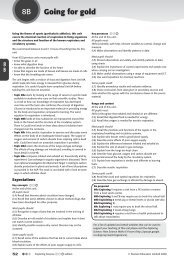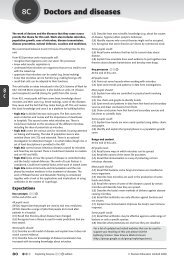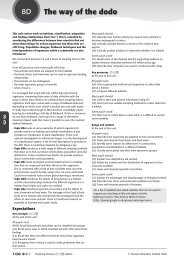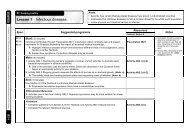8E TEACHER GUIDE.pdf - swallowhillresources
8E TEACHER GUIDE.pdf - swallowhillresources
8E TEACHER GUIDE.pdf - swallowhillresources
- No tags were found...
Create successful ePaper yourself
Turn your PDF publications into a flip-book with our unique Google optimized e-Paper software.
<strong>8E</strong>aUsing water<strong>8E</strong>aPupil’s materialsNumber and title Level Location Type TasksUsing water All PB p63 Classwork Exploring 1The solution is clear Must PB pp64–65 Classwork Explaining 1<strong>8E</strong> Quick Quiz Must/Should ASP Classwork Starter 4<strong>8E</strong> Quick Quiz Answer Sheet Must/Should ASP Classwork Starter 4<strong>8E</strong>a Quick Check Must/Should ASP Classwork Plenary 1<strong>8E</strong>a Word Sheet Must ASP Classwork<strong>8E</strong>a(1) The solution is clear Must CHAP Access Explaining 1<strong>8E</strong>a(2) Operation survival 1 Must CHAP Practical Exploring 2<strong>8E</strong>a(3) Operation survival 2 Should CHAP Practical Exploring 2<strong>8E</strong>a(4) A soluble puzzle Must CHAP Homework Homework 1<strong>8E</strong>a(5) Filtering Must/Should CHAP Homework Homework 2<strong>8E</strong>a(6) Water for life Should CHAP Homework Homework 3<strong>8E</strong>a(7) Treating our water Could CHAP Homework Homework 4Learning objectivesExemplar topic plansAll pupils must:(1) explain what a mixture is and what a solution is(2) describe how to filter a mixture(3) explain why filtering works and why it cannot separatesoluble solids from a liquid(4) apply their knowledge of filtering for a practical purpose(5) recall that there are a number of liquids that can be used assolvents(6) explain why we cannot drink sea water.Correctly use the words dissolve, filtering, insoluble,mixture, opaque, soluble, solute, solution, solvent,transparent.Most pupils should:(7) appreciate that some mixtures are easier to separate thanothers(8) recall that solutes which are insoluble in water may dissolvein other solvents.Correctly use the words filtrate, residue.Some pupils could:(9) recall some of the ways in which our water is treated beforeit is supplied to homes(10) describe different mixtures of solids, liquids or gases.MUSTPB pages63–65COULDPB pages63–65Starter 1Exploring 1Exploring 3Explaining 1Explaining 2Plenary 3Homework 1Starter 1Starter 3Exploring 1Exploring 3Explaining 1Explaining 2Explaining 3Plenary 1Homework 4*This table is repeated in <strong>8E</strong>b.SHOULDPB pages63–65SHOULDPB pages64–67Starter 1Starter 3Exploring 1Exploring 3Explaining 1Explaining 2Plenary 2Homework 32 Yr KS3*<strong>8E</strong>a Starter 1<strong>8E</strong>a Explaining 1<strong>8E</strong>b Explaining 1<strong>8E</strong>b Exploring 2<strong>8E</strong>b Plenary 2<strong>8E</strong>b Homework 2Topic notes• Targets for the topic can be accessed via the ActiveBook orActiveTeach from the link next to the initiator question.• Pupils should have covered solutions and dissolving at Key Stage2, but will not have been introduced to all the key words in thistopic.Be prepared: <strong>8E</strong>aStarter 1: cafetiere or coffee filter.Exploring 2: moss or grass.140Exploring Science edition © Pearson Education Limited 2008






